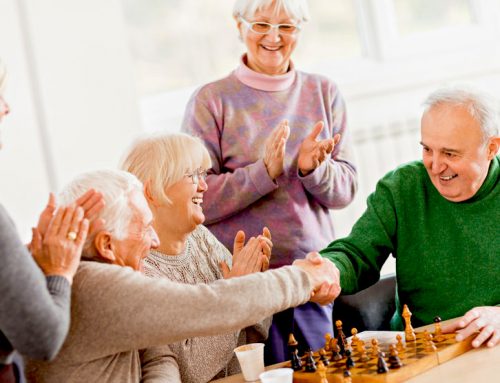We already know that a healthy lifestyle is a major factor in living a long life, but new studies show that having hobbies and staying socially active is equally important for seniors
It has long been known that a nutritious diet, exercise and positive health choices all contribute to helping seniors feel more energetic. In fact, emerging research into longevity indicates that mental and social activity is just as critical as physical activity when it comes to healthy aging. Hobbies, leisure activities and a rich social network are factors that correlate with avoiding isolation and living longer.
Here are a few healthy hobbies for seniors that your loved one might want to consider to live a long life:
1. Caring for a Pet
 Pets provide a comfort system and actually produce a chemical chain reaction in the brain that helps to lower levels of the stress-inducing hormone cortisol and increase the production of the feel-good hormone serotonin. In fact, pets have been shown to reduce blood pressure and stress levels in humans and can actually help lower cholesterol, fight depression and help protect against heart conditions. All great reasons for seniors to have a pet! Learn more about some of the best dog breeds for seniors.
Pets provide a comfort system and actually produce a chemical chain reaction in the brain that helps to lower levels of the stress-inducing hormone cortisol and increase the production of the feel-good hormone serotonin. In fact, pets have been shown to reduce blood pressure and stress levels in humans and can actually help lower cholesterol, fight depression and help protect against heart conditions. All great reasons for seniors to have a pet! Learn more about some of the best dog breeds for seniors.
2. Creating Art / Doing Crafts
More than providing something fun to stimulate the brain, creating art and doing crafts can also be cathartic. From painting, sculpting and scrapbooking to photographing, knitting or sewing — art is one of the best activities seniors can practice. Even better, art can also be done as a social activity with family or friends, so that mingling happens while stimulating the mind and soul. Engaging and fun, art is a great activity at any age, but is especially helpful and rewarding for retired seniors who have time and need activities to keep their minds alert. Art therapy is even used to help stimulate the brain, stir memories and give those with dementia a better quality of life.
3. Dancing
Dancing is not only fun, but is also a great way for seniors to exercise and socialize. Dancing can improve senior balance, gait and overall functioning, while also helping to reduce the risk of falls, fractures and immobility. Beyond those reasons, a study from Albert Einstein College of Medicine showed that ballroom dancing was associated with a lower risk of dementia. The researchers believed that the mental challenge of following complex dance steps and moving in time with the rhythm of the music are responsible.
4. Gardening
Gardening has many health and therapeutic benefits for older people. It’s not only an enjoyable form of exercise, it also increases levels of physical activity and helps increase seniors’ mobility. It encourages use of motor skills while improving endurance and strength and even reduces stress levels by promoting relaxation. Gardening also provides stimulation and interest in nature and the outdoors. Many senior living communities offer gardening clubs for residents as the hobby is definitely a positive and popular hobby that helps promote resident happiness.
5. Golfing
There are many health benefits for seniors who golf. From improving flexibility, ease of motion and strength to also increasing happiness and socialization, golfing is a favorite activity for many seniors. Since people can golf their entire life, it’s an excellent hobby to keep through the years that provides not only satisfaction, but also helps seniors keep hand-eye coordination and improves mood. Golfing is a great hobby to keep your elderly loved one stimulated and happy.
6. Playing Cards/Games
From playing Bridge to Scrabble, cards and games are an excellent way for seniors to keep their minds’ sharp. In fact, research has shown that adults who enjoy mentally stimulating games may have bigger brains and sharper thinking skills than their peers. Higher education has been linked to decreased risk of cognitive decline. Researchers theorize that well-educated people have better connected synapses in their brain, which also helps compensate for the havoc wreaked within the brain by Alzheimer’s and other dementias. Critical thinking and crossword puzzles are also great ways to keep the brain fit.





Leave A Comment